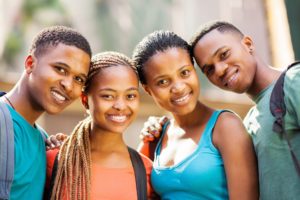How Black Teens are Keeping Optimism in America
I wanted to write about this because adolescence is a critical point in our lives and the media usually tells marginalized teens’ stories in limiting and harmful ways. Their voices are so important but often go ignored until reaching some crisis point. As Black History Month continues, I gave thought to the Black Student Union (BSU) meetings my sons attend regularly and how this month they are engaging the whole school in trivia and planned events to raise the level of education about Black history. As the young people of BSU keep reminding everyone, “Black history is American history.” This transformative and critical turning point in a young person’s life needs our attention and care. How we prepare our teenagers for this world is crucial but with the truth, they are capable of maintaining hope for their future.
Black teens in America sometimes don’t get the room to be seen and heard when they’re coming of age. Harmful stereotypes, toxic tropes, and bias often leads to inaccurate and limiting portrayals of their lives. In reality, many of these teens are far more powerful, beautiful, creative and multifaceted than many adults give them credit for. They are the hope that leads the charge to fight for a more equitable and progressive future. Look at how Generation Z, the demographic born between 1997 and 2012, is leading the charge during a global pandemic, the destructive effects of climate change, continued racial injustice, and much more. And they are the voice that empowers those who need it most. They’re creating their own rules in a society with systems that have failed them time and time again. I think many of us in past generations had a harder time expressing vulnerabilities. We felt we couldn’t be weak because someone could take advantage of that. You had to show exterior strength and it led to not always talking about the mental strains felt. The pain and generational traumas that lingered are being discussed and dealt with more in this young generation.
I asked my two teens and several members of their local chapter of BSU for some feedback. Here’s what I learned from them. If they want to feel optimistic, usually they stay off the “areas of social media where the polarizing opinions of people that tear us apart are.” I learned they are trying to educate themselves politically to understand why such systems that limit BIPOC have been hard to remove and how they can personally change/affect the outcome of this country. They are not apathetic when it comes to getting something done. They are ready to vote, and as one young man named Matt said “Educating myself on social justice issues and being active in my community has kept me optimistic for the future. After experiencing such rapid and radical change occur in our nation over the past two years, I feel more confident about our ability to actually make a change in the world that we live in. We are now living in a time where posting about social issues can reach an audience of hundreds or thousands. We are able to have mutually beneficial discourse, share experiences, listen and adapt at such a fast rate…”
Another teen shared, “I couldn’t name you a single Black person I know who would register as a Republican now. This is because of what was seen as differences in ideology becoming a debate of whether or not a Black person’s life mattered. Why is that so hard to say and why is it still a matter of debate?” I agreed and offered my counter example of how despite personally battling breast cancer, I supported various cancer walks and donation funds. I’d never say to someone that we don’t need more research and events for any other particular cancer because All Cancers Matter and then proceed to shut down further discourse.
The teens said, “when people say, ‘Save the babies,’ other people don’t say, ‘That’s divisive because you’re not talking about saving the old people.” I add the question of why do they find it divisive saying Black Lives Matter. These younger ones say it stands for a call out for justice, respect, and empathy for every life but raising awareness for one group who have been heavily affected by discrimination and misrepresentation for centuries. It means you’re interested in basic human rights. This should have never been interpreted as something controversial. One of my sons told me that whenever he and his friends get tired of the trolls and haters, they cope as a group with the help of “chat while gaming and texting my friends on Discord but avoiding the controversial topics. Some people only like to fight, argue, or intimidate others, nothing more. My friends and I need each other in order to have time where we are not so worried and on edge.”
I kept finding a theme with these teens. Each of them had been on a journey to make sure they are purposeful in the ways in which they show up. The high school seniors of the group said the pandemic almost “snatched dreams away” because some became apathetic with their schooling and discouraged by the lack of social responsibility a part of our nation showed. This pandemic has been an uphill battle for them, but they are rising to the occasion. They are also doing an amazing job of addressing their own mental health and trying to keep their anxiety levels down and get help for any depression. They are networking with and educating those around them. They are finding and keeping the hope they need for life in America.


